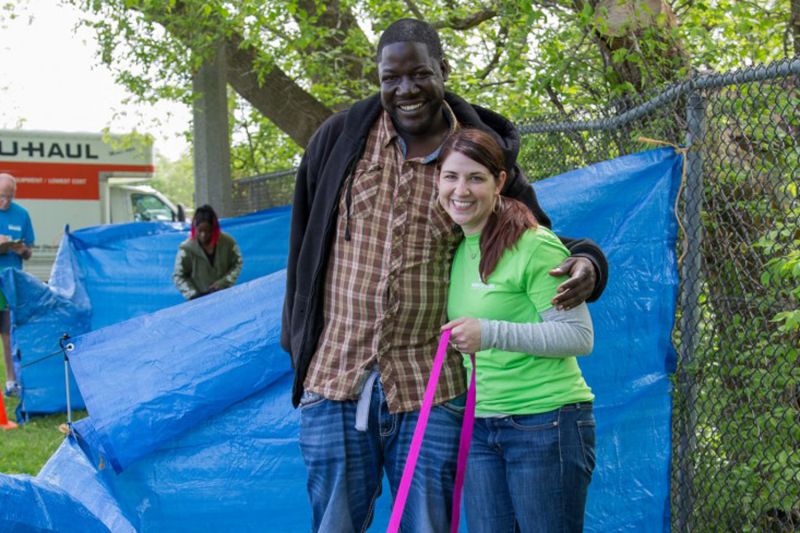A new approach to community connections
The Wisconsin Humane Society uses positive experiences in the shelter as a springboard for trust in the community
July 25, 2017

I want to tell you about a family that we at the Wisconsin Humane Society met in 2014. On the surface, the family might have seemed like unlikely partners, but our experience with this family reminded us that the people we serve are not barriers to us achieving our mission, but are in fact an integral part of it.
Shelter staff found a young man, around 18 or 19, holding his puppy in our parking lot and crying. The puppy was very ill, and we suspect was dying from parvovirus; the family came to us seeking euthanasia services. They had given the puppy two rounds of vaccines, but missed the final round of distemper/parvo shots, not realizing that left the dog vulnerable to parvovirus. Unfortunately, the virus had progressed to a point that the puppy did not make it.
Rather than judging this family, our team met them where they were and treated them with compassion. It was clear that they deeply loved this puppy but just didn’t know how critical that last vaccine was. We knew the family wanted a dog to love, so we talked to them about whether they were ready to support another dog in their home. Because parvovirus lives on surfaces for a long time, we put some thought into the right match, wanting the family to take home an adult dog who had titers to protect him from the virus. The family chose an adult male they named Sire.
By choosing to support the family in this way, rather than judging the fact that their puppy wasn’t fully vaccinated, we were able to ensure that the family’s next dog was protected from parvovirus. Had we not supported an adoption, the family might have gotten a young or unvaccinated dog who would have been vulnerable to any virus still in their home. Instead, we created a connection with the family and turned a tough situation where they felt vulnerable into a positive one. By doing that adoption, we sent home a dog who was altered and protected from parvovirus. We also became a resource for them, ensuring they have the needed support for their new family member. Sire has a loving family, and the family has peace of mind knowing that their dog is protected from parvovirus.
Every interaction our shelter staff has with the public is an opportunity to either inhibit or improve our relationships with the community, which are critical to the success of our mission. Our staff could have chosen to judge Sire’s family or create barriers for them to connect with our adoption program or other services, but that likely would have destroyed our relationship with the family and our ability to connect with any future animals in their home. Instead, we used the opportunity to share information and resources and build a connection to the family and their new animal.
The nonjudgmental approach is a hallmark of the HSUS Pets for Life program, a grassroots community outreach initiative that brings pet wellness information and resources to underserved neighborhoods. The Wisconsin Humane Society became part of the Pets for Life mentorship program in 2012, and our involvement has changed the way we think about our work both inside and outside our shelter walls.
Our organization is lucky to have three incredible staff through our Pets for Life outreach program, and that team has served 8,300 animals from nearly 5,000 families over the last five years. The team works with an incredible volume of people and animals, and we quickly realized that our work in the community blends with our work in the shelter; the work we’re doing in the community is stronger when we have great partners in the shelter. As that team has gained experience and gathered data from the community, we have used that information to shift the way we think about situations in the shelter.
When our shelter staff work toward building relationships in addition to helping animals, as they did with Sire’s family, we reduce the need for our outreach team to establish trust. We use people’s positive experiences in the shelter as a springboard. Every time a client has a helpful encounter with our team, there is one less door we need to knock on to build a relationship. Of course, our Pets for Life program fills pet care resource and access gaps. The gaps don’t disappear, but when we’ve already fostered community relationships and trust, we have more time and resources to provide pet care information and services to the community.
We serve three counties and have a local annual intake of 15,000 dogs and cats; we estimate that there are nearly 750,000 pets in homes and 150,000 pets living in poverty in our service area. A lot of animals never enter our shelter, but we can support them by building strong connections to our community. Shelter staff truly can be agents of change with every phone call, surrender request, adoption and interaction they have with the public.
Our approach to sheltering is people-centered because we know that people and animals are inextricably linked. Building effective relationships with the community aligns with our organizational values: a positive approach, innovation, professionalism, and compassion, respect and kindness. This philosophy guides our organization’s work in the community and within our walls.
No matter the resources your organization has, you can further your impact by working with the folks in your community. Imagine the impact we could have for animals if every time a family like Sire’s reached out, we took the opportunity to support them. Every phone call and visit to our shelter provides us with a chance to build relationships and be an agent for change for people and animals in our community.


